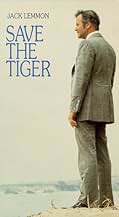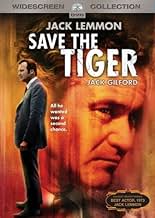Troubled garment manufacturer Harry Stoner tries to make his small debt-ridden factory survive, hires an arsonist to burn down a building so Harry can collect the insurance money, he pimps f... Read allTroubled garment manufacturer Harry Stoner tries to make his small debt-ridden factory survive, hires an arsonist to burn down a building so Harry can collect the insurance money, he pimps for clients, and has flashbacks to the war.Troubled garment manufacturer Harry Stoner tries to make his small debt-ridden factory survive, hires an arsonist to burn down a building so Harry can collect the insurance money, he pimps for clients, and has flashbacks to the war.
- Won 1 Oscar
- 2 wins & 5 nominations total
- Ula
- (as Liv Von Linden)
- Tiger Petitioner
- (as Biff Elliott)
- Model
- (uncredited)
- Director
- Writer
- All cast & crew
- Production, box office & more at IMDbPro
Featured reviews
Little did I know, that thirty years later, I would be going through one of my own and would once again be drawn to, and struck by, the sincerity and integrity of Jack Lemmon's performance.
The film has it's critics, self indulgent, sentimental and simplistic are only some of comments made, but the film still has the power to make you question what you have done with your own life. It asks you how you got to where you are, and it makes you ask yourself if it was all worth it. It also questions/exposes the Great American Dream and asks, if that is not the be all and end all, then what is?
Harry Stoner is not a man you should feel sorry for, but Lemmon's interpretation forces you to question his ideals and your own, as you follow this crisis point in his life. In the end, whether you like the film or not, or agree with what it is trying to say, you can't deny Lemmon his Academy Award.
The best of these options is to start an arson fire in their factory and hope the insurance payoff will cancel their debts and afford a fresh start. Gilford is against it on moral principles, but Lemmon is a guy who can't afford morals at this stage as George Bernard Shaw once put it.
Still he looks back on his youth and the things and people that moved him back in the day and wonders how he got in the mess he's in. It's not supposed to be like this for people like him who've had ideals and tried to play by the rules.
In his facial expressions, his vocal intonations, in every move of his body and soul, Lemmon becomes Harry Stoner the latest convert to cynicism. It's what got Jack Lemmon his Second Academy Award, this time for Best Actor. Interesting that this very cynical film came out the year that a whole lot of Americans became very cynical as Watergate was unfolding before them.
Arson fire is a tricky business and Lemmon puts himself in the hands of Thayer David who I think gives his best screen portrayal here as the professional arsonist. Listening to him, as creepy as he sounds, he comes off as a man who knows his business. He even at one point offers to return the down payment given him when he explains that insurance will never pay off with all the fire regulation violations Lemmon and Gilford have in their place. It's a business with him and no fatalities must occur, otherwise it's a Law and Order episode.
Jack Lemmon was one of the best around, could do all kinds of comedy and drama with equal skill. Building on the characters he created for Billy Wilder, he's an older man now who's in no position to start from scratch again. Lemmon plays a character that all of us over 40 can definitely relate to.
Save the Tiger is a serious and thought provoking drama about choices each and every one of us could face some time in our lives. It's universality of theme will make it an enduring classic.
Jack Lemmon delivers a brilliant, Oscar-winning performance as Harry Stoner, a middle-aged man at the end of his tether, who confuses his personal midlife crisis, and the failure of his fashion business, with what he sees as the USA's moral decline in the post-war years. Obsessed with the lost cameraderie of his active service in the war, with the baseball and jazz giants of yesteryear, and with the slain and fallen idols of the 60s (Kennedy, King, Monroe etc), he sleepwalks into his own moral abyss of an arson plot, comforting himself that he is no worse than the times in which he lives.
Lemmon's character is countered by those of Phil Greene, his business partner, convincingly played by Jack Gilford, and Meyer (William Hansen), the firm's veteran, expert cutter and refugee from Nazism. Phil does not suffer Harry's sense of disillusion, because he is too down-to- earth to have experienced the illusion in the first place; Meyer, also, despite superficial discontent with the changing times, gains strength from his skill and family life.
For me, the main theme here is the familiar one of the lost American Dream, and the film brings to mind the final lines of the seminal exploration of that theme, the Great Gatsby - "So we beat on, boats against the current, borne back ceaselessly into the past." Harry's American Dream is not of a golden future, but of a golden past; it isn't lost, it simply never existed. But, that said, in this movie thematic analysis definitely takes second place to appreciation of Lemmon's bravura performance.
really did have the everyman down to a science. The movie is an excellent
commentary on dreams coming apart, the loss of old friends, and realizing
youre time may have come and gone. Not exactly the most uplifting movie but it is raw and honest. Lemmon and his partner run Capri Casuals, a women's wear
line based in southern California in the early 70's. (incidentally the name comes from the island where most of Lemmons war time buddies were killed and
buried) When times get tough and Lemmon is lowering himself by becoming a
pimp to a big customer, he realizes his American dream might be over. In
consultation with his partner he decides to hire an arsonist to destroy his factory for the insurance. An intense, searing performance from Lemmon, makes Save
the Tiger a movie that should be watched for years to come.
Highly Recommended.
Did you know
- TriviaActor Jack Lemmon waived his usual fee and worked for scale plus a percentage of the gross. Scale was US $165 a week at the time.
- GoofsHarry wipes Fred's face almost completely clean of the red body paint. In a subsequent shot, Fred's face is covered with red paint again.
- Quotes
Myra: Are you OK? Do you want something?
Harry Stoner: Yes. I want that girl in a Cole Porter song. I wanna see Lena Horne at the Cotton Club - hear Billie Holiday sing fine and mellow - walk in that kind of rain that never washes perfume away. I wanna be in love with something. Anything. Just the idea. A dog, a cat. Anything. Just something.
- ConnectionsFeatured in Paramount Presents (1974)
- SoundtracksAir Mail Special
Composed by Jim Mundy, Benny Goodman & Charlie Christian
- How long is Save the Tiger?Powered by Alexa
Details
- Release date
- Country of origin
- Languages
- Also known as
- Save the Tiger
- Filming locations
- Production companies
- See more company credits at IMDbPro
Box office
- Budget
- $1,000,000 (estimated)

































